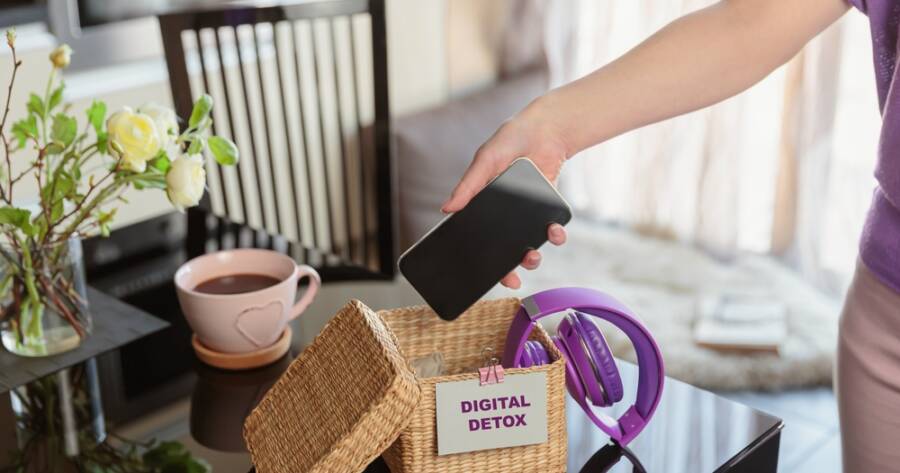In today’s digital world, it’s hard to imagine life without smartphones, social media, and constant notifications. While technology connects us, it also creates distractions and stress. Many people are now turning to digital detoxes to reclaim their time and focus. But can a 30-day break from screens really improve your mental clarity and happiness?
What Is a Digital Detox?
A digital detox is a period where you disconnect from electronic devices, such as smartphones, computers, and social media platforms. It’s not just about taking a break from technology—it’s about resetting your relationship with it. The idea is to reduce screen time and be more present in real-life experiences.
A 30-day digital detox means committing to a full month of consciously limiting your device use. This could involve setting boundaries for checking emails, limiting time spent on social media, and avoiding screens after a certain hour. The goal is to give your mind the space to reset and recharge.
By cutting out constant distractions, a detox gives you the chance to rediscover your focus and bring back joy in simpler, offline activities.
The Impact of Technology on Focus
Many people struggle to concentrate due to the constant interruptions from digital devices. Social media, texts, and notifications often pull us away from tasks, making it hard to stay focused. Research shows that even the presence of a smartphone nearby can reduce cognitive performance.
When you’re constantly jumping between tasks, your brain doesn’t get the opportunity to focus deeply on one thing. This leads to mental fatigue, decreased productivity, and stress. A digital detox helps you break free from this cycle.
During a detox, you learn to focus more deeply on the tasks at hand. Whether it’s reading, working, or simply relaxing, you can direct your attention fully without the need to check your phone or laptop constantly. Over time, this boosts your ability to concentrate and think clearly.
Reconnecting with the Present Moment
A digital detox isn’t just about reducing screen time; it’s also about reconnecting with the present moment. Many people feel like they are living in a virtual world, constantly consumed by updates, notifications, and online interactions. This disconnection from the real world can lead to feelings of isolation and anxiety.
Without digital distractions, you can start enjoying face-to-face interactions and the simple pleasures of life. A 30-day detox can help you rediscover hobbies or experiences you may have forgotten, like going for walks, journaling, or spending quality time with family and friends.
Studies have shown that being present and engaging in real-world activities is essential for emotional well-being. People who regularly disconnect from their devices report feeling more relaxed, connected, and happier. These offline moments often lead to greater fulfillment because you’re truly engaged with the world around you.
How a Digital Detox Affects Mental Health
Constant exposure to digital media, especially social media, can contribute to anxiety, depression, and stress. The comparison culture that social media fosters can leave you feeling inadequate or left out. The pressure to be constantly “on” and available can lead to burnout, while the never-ending stream of information can overwhelm your senses.
A digital detox provides much-needed relief from this mental overload. When you take a break from the digital noise, your mind can finally rest. This rest period allows your nervous system to recalibrate, lowering stress levels and improving mood. Without the barrage of negative news and unrealistic expectations, you may feel more at ease and content.
During a detox, many people find that their mental health improves. They sleep better, feel less anxious, and have more energy throughout the day. As a result, they are better able to focus on what truly matters and feel more positive overall.
Creating Healthy Tech Habits After the Detox
A 30-day digital detox is just the beginning. The goal isn’t just to take a break—it’s to create long-lasting, healthy habits around technology use. After a detox, you can establish boundaries for using your devices. This might mean limiting screen time in the evenings or setting aside specific times during the day for social media.
The key to making the benefits of a detox last is mindful tech usage. For example, instead of reaching for your phone every time you’re bored, you can replace that habit with something more meaningful, such as reading or taking a walk. You can also organize your digital space by unsubscribing from unnecessary emails or unfollowing accounts that don’t bring joy.
By making technology a tool rather than a distraction, you can maintain the mental clarity and happiness you found during your detox. The detox serves as a reset, allowing you to live more intentionally with technology in the long run.
How to Begin Your 30-Day Digital Detox
Starting a digital detox might feel intimidating, but it doesn’t have to be all or nothing. Begin by setting clear intentions for your detox. Decide which areas of your digital life you want to cut back on, such as social media or emails. Gradually reduce your device usage and replace screen time with offline activities you enjoy.
You don’t need to disconnect from everything—perhaps choose certain apps or devices to take a break from. For example, you can choose to avoid social media for the full 30 days but keep using email for work. The goal is to reduce your screen time and make room for more intentional living.
Letting others know about your detox can help set expectations, especially if you rely on your devices for communication. During your detox, try to stay consistent with your goals, but be kind to yourself if you slip up. It’s all about progress, not perfection.
A Fresh Start for Your Mind and Life
Taking a 30-day digital detox isn’t just about taking a break from screens. It’s a chance to improve your focus, boost your happiness, and develop a healthier relationship with technology. With the right mindset, a detox can lead to lasting improvements in both mental health and life satisfaction.

